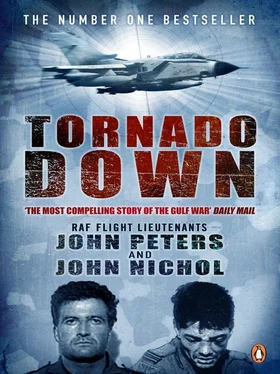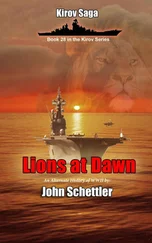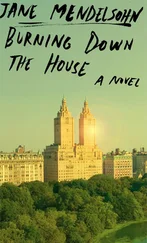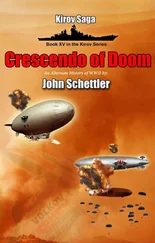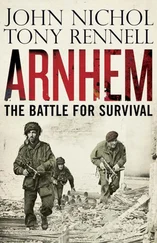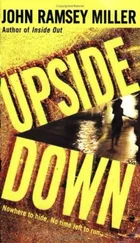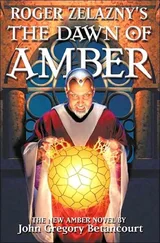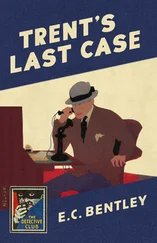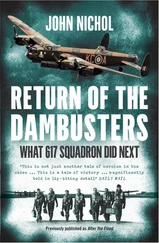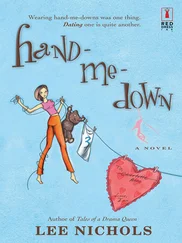Following this tearful reunion, we were all whisked off to a waiting Hercules. I settled down for the short hop to King Khaled Military City (KKMC) airfield, where we would pick up a second plane for the trip to Cyprus.
One of the Hercules’ crew came up to me: ‘Flight Lieutenant Nichol, I think you should see this…’ He was holding out a British newspaper report from the early days of the war, which stated that John Peters and myself had been tortured and killed… Then there was a second newspaper article, again front page, giving the news of our release. It showed JP arriving in Cyprus, and had a picture of Helen, Guy and Toni at home. There was also a picture of me, the one that had been taken off the Iraqi television broadcast. It wasn’t this picture that got to me, though that was bad enough: it was the report itself, which said that my parents were battened down behind closed doors. They were prisoners of the press. The story said that they did not know I was alive! The news was shattering. It was appalling. I could see my parents sitting in the dark, the house shuttered up like a bunker while the press, eager as ever to sensationalise, prowled about outside. It was more than I could take. I found it hard to control myself.
Squadron Leader Gordon Buckley was waiting to greet the aircraft at KKMC. Normally my Flight Commander on the Squadron, he was to be my personal escort home. I could not have wished for a better one. We hugged each other a bit, then he stepped back and said, ‘Nichol, you stink. You need to get rid of that stuff you’re wearing.’ He handed me over a clean flying-suit. He also gave me a goodie-bag: by the time I was released, the powers that be had realised that the POWs had nothing other than the disgusting clothes they stood up in. And no one, after all, knew what to expect, or even how many of us would be coming out. The goodie-bag was an Aladdin’s cave. It held a Walkman personal stereo, fluffy white clean towels, soap (soap!), entire galaxies of mouth-watering chocolate… it was good to be back, bang in the middle of consumer capitalism. But despite the distractions of alcoholic drink, and my favourite meal, chicken tikka and all the trimmings, some of the flight to Cyprus passed in a blur, as the anxiety about my parents kept on bubbling up.
Still, by the end of it I was feeling better, laughing and joking with Gordon. We drove over to the hospital. As I walked through the entrance, the first person I saw was John, John Peters, striding towards me. He looked squeaky clean, but skeletal, definitely not as large as life. We had a couple of victory hugs. It was absolutely fantastic to see him. We had come through, and that was ecstasy.
As with JP and all the other released POWs, Wing Commander Gordon Turnbull, a superb man, was overseeing my rehabilitation. He strode into the meeting-room.
‘What do you guys want?’ he asked. What did I want? I was desperate, desperate, desperate to get to a telephone. The thought that my parents still had no idea whether I was alive or dead, and were worrying themselves sick, was consuming me.
Some of the hospital staff appeared, wanting us to go through some medical checks, but I was adamant: ‘A telephone,’ I said. ‘That’s what I want! Get me a telephone now!’ I got my telephone. But I did not get my parents – at least not immediately.
Instead, a voice said, ‘Caller, what number are you trying to get?’
‘What?’ I replied, in outrage. I had dialled my home number – so what was happening?
What was happening was that my parents had been so harassed by the media that their telephone calls were being intercepted. On top of that, the operator could hardly hear me, the line was so bad. After so long, after so much heartache, it was incredibly frustrating: I screamed down the telephone, ‘Put me through, put me through! I’m John Nichol! I’m their son.’
The operator kept replying, in a cool Newcastle voice, ‘What number are you calling?’ I must have sounded just like a frustrated journalist.
I slammed the telephone down. Grabbing another phone card, I rang my elder brother’s home, in Welwyn Garden City. No sooner did I hear Paul’s voice than I broke down in tears. He started crying too; my sister-in-law, Angela, came to the telephone, she was weeping for joy. It was her birthday. There was not a lot of coherent conversation, but there were plenty of long pauses.
‘Calm down,’ Paul managed to say eventually. ‘Give me your number.’ I gave it to him. He called my sister Teresa, who lives around the corner from my parents. Teresa dashed round to them with my number; they then telephoned me in Cyprus.
My breakdown on the phone to Paul was as nothing to the tear-floods now. The first sound of my dear mother’s voice was enough.
I was dimly aware of John Peters coming into the room. Despite the fact I had not spoken to him for so long, I was utterly unable to speak to him then. Immediately recognising what was happening, he simply bent down, gave me a quick hug, and went out again. Through the haze, I remember him saying, as he went through the door, ‘Don’t worry, everyone has reacted like that.’
I wasn’t worried.
The next thing on the agenda was a recuperative beer. As far as I could make out, there was none to be had in the immediate vicinity – I had already checked the bedside cabinet. Considering that we hadn’t had a beer for a couple of months, this looked like something of an oversight. Rupert Clark and I had been released together, and he felt pretty much about the beer shortage as I did. All psychological rehabilitation programmes should invariably include beer, we decided; it was an essential lubricant in easing the old emotional springs. We diagnosed one another as being sadly lacking in carbohydrates and in real need of some liquid sustenance. So we became the first Allied POWs to form an escape committee! We managed to convince one of the medical team to drive us down to the bar in the Officers’ Mess – only for one quiet beer, of course. We did have the one quiet beer, but it was rapidly followed by about ten extremely noisy ones! What could be better therapy, we asked ourselves, than to be back in a RAF bar with a few beers and a fair sprinkling of attractive women? The President of the Mess invited us to drink at the Mess’s expense for as long as we liked – we needed no second bidding! – prison breath and all. With the huge number of aircrew passing through Akrotiri, the atmosphere was extremely convivial: there were friends there I had trained with and had not seen for years. What we did not realise in our cups was that there had been a terrorist alert in Cyprus on that very same day, and the whole island was in a state of high security. So within a moment or so of our disappearing from our hospital beds, there was a general assumption we had been kidnapped, with the resulting rumpus. The Officers’ Mess bar was the last place they thought of looking for us: too obvious. We returned to the hospital a little the worse for wear and a bit ashamed at having caused the people who were looking after us such trouble. ‘Twas good fun though!
John Nichol: Like JP, I had Gordon Turnbull to help me get back onto the straight and narrow path of sanity. He began with a mini-lecture. Post-Traumatic Stress Disorder (PTSD) is not a disease, he said, but a syndrome; it can and does affect anyone, and there is nothing ‘unmanly’ about experiencing it. There are many symptoms:
Violent outbursts
Unwillingness to talk about experiences
Unexplained changes in character
Self-loathing for surviving when others did not
Self-isolation
Inability to readjust to normal life
Inability to communicate with loved ones, or to reciprocate love
Читать дальше
